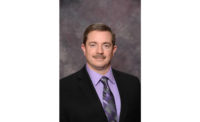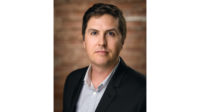Every successful project starts with a framework. A vision statement. A blueprint. The editors of Engineered Systems are proud to present The Blueprint — a monthly Q&A interview with HVACR engineering’s leading voices. These one-on-one discussions will examine the trade’s history, current industry trends, the factors shaping the sector’s future, and more.
Delta Electronics, founded in 1971, is a global provider of power and thermal management solutions. Its mission statement, "To provide innovative, clean, and energy-efficient solutions for a better tomorrow," focuses on addressing key environmental issues, such as global climate change. As an energy-saving solutions provider with core competencies in power electronics and automation, Delta's business categories include power electronics, automation, and infrastructure.
Alex Lee, vice president of channel business at Delta Electronics (Americas), discusses the company’s 50th anniversary, its commitment to the RE100, its activity on the acquisition front, and more in the latest installment of the Blueprint.
Engineered Systems: Please start by introducing yourself and Delta Electronics.
Lee: My name is Alex Lee, and I’m the vice president of channel business at Delta Electronics (Americas). I joined Delta in 2001 and spent much of my career at Delta focused on sales and product management for fan and thermal management products. Under my leadership, Delta was honored with the prestigious Energy Star Partner of the Year award from the U.S. Environmental Protection Agency (EPA) for six years in a row. Lee holds a master’s degree in social science from National Sun Yat-sen University in Kaohsiung, Taiwan.
Delta was founded in 1971, originally as a producer of TV components. However, the global oil crisis in the early 70s as well as the energy shortages and pollution affecting Taiwan’s fast-growing manufacturing sector ignited Delta’s founder’s, Bruce Cheng, interest in energy conservation and environmental protection, especially since companies relied mostly on linear power supplies with energy efficiency well below 50%. Thus, he led the company to focus on the production of switching power supplies, which had the potential to revolutionize the concept of energy efficiency. Through long-term commitment to research and development, Delta continuously improved the energy efficiency of its power supplies, eventually becoming one of the world’s first to achieve the 80Plus TITANIUM-certified server power supplies with over 96% efficiency. The company’s solar PV inverters and telecom power products achieved world-leading energy efficiency up to 99.2% and 98%, respectively. Delta constantly evolves in line with global megatrends to enhance its competitiveness. Moreover, it entered the industrial automation industry in 1995 with the development of its first AC motor drive, while it started producing electric vehicle (EV) chargers more than a decade ago. The company has a global footprint, with more than 170 sales offices, 74 research and development centers, and 45 factories in five continents. In 2021, Delta’s annual revenues surpassed $10 billion. The company’s ESG endeavors have been widely recognized by world-class institutions, such as the Dow Jones Sustainability Indices, which has not only included Delta in its DJSI World Index for more than a decade.
Engineered Systems: The company celebrated its 50th anniversary in 2021. Over that time, what has changed the most and what has stayed the same?
Lee: The entire world has seen unprecedented change over the past 50 years, especially given the rise of the IT industry. Global connectivity has accelerated the need for high-speed data centers and mobile devices. Mankind’s current urge to lower its carbon footprint has also been historic, especially as the world strives to nurture energy conservation in carbon-intensive industries, such as manufacturing, transportation, buildings, energy generation, and IT infrastructure. These two megatrends are at the core of Delta’s strategic development as reflected in our ESG-embedded business model as well as in our product and solution portfolio. An example of how things have changed is our new Delta EV Charging Station in Yokohama, Japan, which has created on the site of a traditional gas station. The station features Delta’s fast DC power EV chargers, AC power chargers as well as our energy storage solutions to enable efficient use of energy. Also, the station includes a smart coffee shop that provides EV drivers with a comfortable, safe, and healthy environment while their EV gets recharged.
Some things have not changed in these 50 years. For example, the world keeps expanding, the physical world (population, cities, industries) keep growing in size and depth, and now it seems to be expanding in the digital world as well (metaverse, etc.). Also, the critical need of our customers to enhance their competitive edge has also remained unaltered, and that makes them demand solutions with increasingly higher added value.
Engineered Systems: What does the next 50 years hold for the company?
Lee: Delta’s direction for the next 50 years is to contribute significantly in mankind’s goal to realize a carbon-neutral world capable of securing the sustainable global ecosystem for our next generations. Thus, we are committed to the development and deployment of innovative solutions that leverage next-generation technologies (AI, IoT, next-generation semiconductor technology, etc.) as well as our decades-long experience in smart manufacturing, energy efficiency, and system integration to ultimately nurture that vision. Within that journey, we look forward to expanding further across all five major continents to build a more capable company through research and development and mergers and acquisitions as well.
Engineered Systems: Delta joined the RE100 last year, committing to 100% renewable energy use and carbon neutrality in global operations by 2030. Why is this so important to the company, and what HVAC technologies does Delta intend to use to achieve this goal?
Lee: RE100 is essential for Delta because ESG is embedded inside our corporate mission, and that mission entails the production of our solutions with the lowest carbon footprint possible. Also, low-carbon production is an area in which Delta holds a privileged advantage when compared to many of our competitors, therefore, we have not only committed to the RE100 promise with a very aggressive target (2030) but also have gone beyond by promising to reach net-zero emissions as well by the same year.
Engineered Systems: Delta made a couple of acquisitions last year, including the purchase of Universal Instruments. Tell us about this transaction as well as any other that are worth mentioning.
Lee: We can’t elaborate much further since the formal closing day of this transaction is still a few days away, but we are confident that significant synergies will emerge from this acquisition, especially as we add truly innovative and state-of-the-art automation equipment into our industrial automation product and solution portfolio that will provide our global customers with a broader one-stop-shop offering. Delta’s global customer base will also expand business opportunities for Universal Instruments.
Engineered Systems: Does the company intend to continue being active on the acquisition front in 2022-2023?
Lee: Definitely. We continue to assess several opportunities with the potential to strengthen our solution portfolio.
Engineered Systems: Delta is well-versed in thermal management solutions. This is evidenced in Singapore’s first smart business district, which featured a broad range of Delta’s industrial automation, thermal management, and LED lighting systems. Can you introduce us to this project and share how Delta’s innovations helped bring it to life.
Lee: Back in July 2021, we showcased a containerized, smart farm solution that facilitates the production of vegetables in an ideal environment (no pesticides required, water-efficient, low carbon emissions), especially for a country like Singapore with very limited space for agriculture. Moreover, the current supply chain difficulties related to the COVID-19-induced lockdowns have reminded us of the importance for countries to have resilient production ecosystems, including agriculture. Our solution leverages our DC brushless fans, for which Delta has been a global leading provider since 2006 to provide airflow and thermal management to the crops and operated with our smart automation technology based on pre-determined parameters that better suit the respective type of vegetables. That automated operation also regulates the lighting intensity and duration as well as the water irrigation process. With this solution, customers can save close to 95% of the water required in traditional farmland and use only a fraction of the land required for the equivalent quantity of vegetables produced. This is a great example of Delta’s unique competence in system integration to enable solutions capable of supporting sustainable development and we are exploring ways to deploy this containerized smart farm in Singapore and beyond with the help of our local partners.
Engineered Systems: How has COVID-19 impacted the company’s progress? What role will it continue to have on your future?
Lee: Delta implemented strict virus-containment practices in all its worldwide operation sites that successfully limited the impact of the pandemic. Fortunately, our business and manufacturing operations did not suffer major disruptions, and, in fact, as the world realized that low-carbon technologies favor better health conditions, our Delta smart green solutions have been in high demand these past two years. We also designed and produced solutions to help improve the health conditions of buildings against the virus and other related elements. For example, our new Delta U+ UV Disinfection Gates feature ultra-violet (UV) lighting systems to help reduce the presence of viruses and bacteria at the entrance of buildings. After installing these gates in our office buildings in Taipei, we also donated some to the Taiwan Taoyuan International Airport and the National Taiwan University Hospital.
Engineered Systems: Delta offers a broad spectrum of smart, energy-efficient, HVAC solutions. Can you highlight one or two and share their importance in today’s marketplace?
Lee: Delta Breez ventilation offers DC motor technologies and smart features and holds an important market position in residential ventilation market. The developing electronically commutated (EC) fan business also is important to the market — this is a key component to commercial and industrial HVAC systems — EC fans/motors provide energy efficient solutions to replace traditional AC solutions.
From my viewpoint, Delta Breez offers all the benefits of DC motor technology and smart features, holding an important market position in the residential ventilation market. The developing EC fan business also is vital to the market. This is a key component for commercial and industrial HVAC systems, where EC fan/motor technology provides energy-efficient solutions to replace traditional AC solutions.





